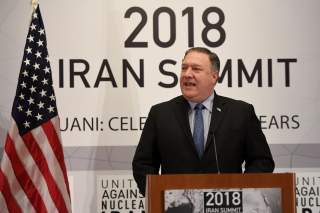'Swagger' Doesn't Make up for Bad American Foreign Policy
An evaluation of Mike Pompeo's four months on the job.
When Mike Pompeo was nominated by President Donald Trump in March to replace Rex Tillerson as Secretary of State, the former congressman from Kansas and CIA Director knew immediately that he had his work cut out for him.
To many employees, former diplomats, and outside observers, Tillerson’s year-long reign was a disaster zone. The Texas oil magnate was depicted as aloof from his workforce, trapped in the seventh floor and isolated from the worker bees, and out-of-touch with the prevalent grumbling of the career foreign service officers who were questioning whether their work was appreciated by the boss. Tillerson seemed more animated with cutting the department’s budget and overhauling its bureaucracy than with traveling the globe and negotiating agreements. When President Trump abruptly fired Tillerson via tweet, his personal and professional relationship with the White House was broken and the department’s senior leadership was left rudderless.
Has Mike Pompeo turned the ship around? After being on the job for four months, how is former CIA chief doing?
On making the State Department great again, Pompeo is well on his way. He promised to inject some excitement back into Foggy Bottom’s ranks, pledging to senators on the Foreign Relations Committee that he would freeze any further job cuts and begin recruiting the best and the brightest into the diplomatic service. Pompeo pledged to the State Department workforce that he would bring swagger back to the diplomatic community, all the while assuring his new employees that their contributions to U.S. security were highly valued. During his first speech on the ground floor, Pompeo lauded those around him as “patriots and great Americans” who will no longer be shut out or dismissed by the senior leadership.
Whereas Tillerson had a terrible relationship with Trump, at one point calling him a “moron” behind his back, Pompeo was able to gain the trust and confidence of the Commander-in-Chief during his previous stint at the CIA. Moreover, Pompeo’s personal ties with the president were a boon to the State Department’s institutional weight in the national security decision-making process; Foggy Bottom’s recommendations were no longer brushed aside as inconsequential.
On actual deliverables, Pompeo’s four months have produced little. He gets credit for taking ownership of the North Korea file, traveling to Pyongyang on multiple occasions and meeting with North Korean leader Kim Jong-un, the North Korean Foreign Minister, and the Vice Chairman of the Workers Party in order to grease the wheel of what has quickly turned out to be a difficult negotiation. For a foreign policy community in Washington begging for more proactive diplomacy from the nation’s top diplomat, Pompeo’s action-oriented approach on North Korea is a welcoming change from the Tillerson era.
Yet like all men and women asked to do a difficult job, Pompeo also has his faults. He is turning out to be one of the most politicized secretaries in the modern era, clashing with Democrats on Capitol Hill as if he were still a Tea Party congressman representing deep-red Kansas. One gets the feeling at times that he sees Democrats on the Senate and House foreign affairs committees as political enemies to be scorned rather than lawmakers whose demands for oversight should be taken seriously. Officials speaking to the press have described the Pompeo-led State Department as a highly political and indeed tribal place where those who don’t exhibit sufficient loyalty to Trump are in jeopardy of being removed or demoted. As one of those officials remarked, “I wouldn’t want to be a State Department employee with a public Twitter feed that is at all commenting on the state of politics in the country.”
And at a time when the National Security Strategy and the National Defense Strategy has emphasized China and Russia as revisionist powers and geopolitical competitors to the United States, Pompeo’s obsession with Iran is misplaced and at times clownish. While Iran may be a troublemaker in the Middle East, it is no existential threat to America. Iran does not have the military power, economic pull, or political alliances to become a regional hegemon. Pompeo, however, has an almost extremist view of the Iranian problem: crank up as much pressure on the Iranian economy as possible in order to spur an internal, grassroots rebellion against the government, and spurn all dialogue with Tehran until it capitulates unconditionally to American demands.
On the flip side, the secretary (like the administration more broadly) places far too much faith in Saudi Arabia. No two nations have national-security interests that are completely compatible, but you would be mistaken for believing Pompeo thinks differently when it comes to the Saudis. This is likely a big reason why he chose to override the concerns of many of his own advisers by providing Congress with a positive certification of Riyadh’s conduct in Yemen. That stamp of approval allows the United States to continue to provide logistical assistance to the Royal Saudi Air Force as it bombs what is left of Yemen’s infrastructure.
There is a case to be made that Mike Pompeo has indeed given the State Department its swagger back. But no amount of swagger will mean very much in the long-run if the policies the State Department implements create more problems for U.S. national security than they resolve.
Daniel R. DePetris is a columnist for the American Conservative and the Washington Examiner. @DanDePetris
Image: U.S. Secretary of State Mike Pompeo speaks during the United Against Nuclear Iran Summit on the sidelines of the United Nations General Assembly in New York City, U.S. September 25, 2018. REUTERS/Darren Ornitz

